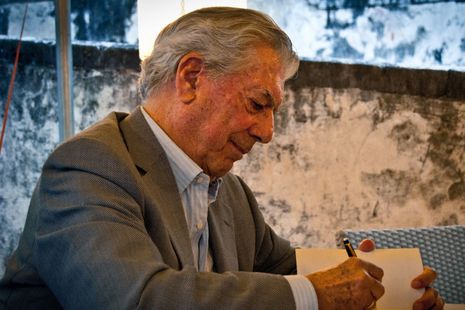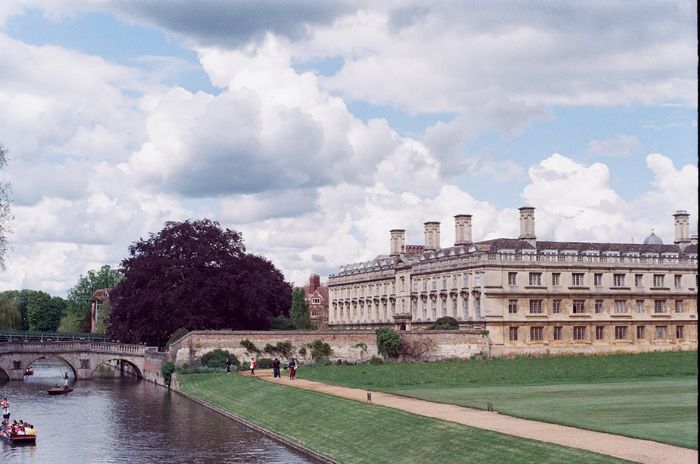‘So many lives’: a Nobel laureate’s year in Cambridge
Angello Alcázar remembers the year that the novelist Mario Vargas Llosa spent in Cambridge

On April 13th, legions of readers around the world mourned the passing of Mario Vargas Llosa in Lima, Peru at the age of 89. Even though he had recently celebrated his birthday towards the end of March, those closest to him knew that he didn’t have long to live. On that momentous occasion, his son Álvaro wrote: “Happy birthday, Varguitas! So many lives in one.” Unbeknownst to many, one of those many lives unfolded in Cambridge over the course of the 1977-1978 academic year.
Globally recognised as one of the most important authors and intellectuals of the twentieth century, Vargas Llosa is best remembered as the last survivor of the so-called “boom” of Latin American literature, a historic phenomenon that gave rise to the region’s novelistic production during the 60s and 70s. The other protagonists of this boom were Julio Cortázar from Argentina, Carlos Fuentes from Mexico and — the most famous of the quartet in the Anglophone world — Gabriel García Márquez from Colombia. Like García Márquez in 1982, Vargas Llosa was awarded the Nobel Prize in 2010 “for his cartography of structures of power and his trenchant images of the individual’s resistance, revolt, and defeat.”
In a career that spanned over six decades, the Peruvian writer accrued numerous other accolades, including the Cervantes Prize and his unprecedented induction into the Académie Française. He wrote prolifically in multiple genres, from fiction and the essay to journalism and theatre. He became disenchanted with socialism and drifted towards the current of liberalism, eventually running for the presidency of Peru in 1990 (an experience he registered in his memoir A Fish in the Water). In consonance with Gustave Flaubert’s maxim that “writing is a way of living”, adventure — both in life and in literature — was the compass that guided Vargas Llosa’s existence.
“Vargas Llosa’s rigorous work routines did not dwindle during his time at Cambridge”
It was in the same house where he died, perched above the Pacific in the bohemian neighbourhood of Barranco, that Vargas Llosa received the invitation to become the Simón Bolívar Professor at the Cambridge Centre of Latin American Studies (CLAS). His tenure at the university — where he was also Overseas Fellow at Churchill College and conferred an honorary doctorate in 2013 — started the same year he published Aunt Julia and the Scriptwriter (1977), a semi-autobiographical novel loaded with humour that was adapted into a movie with Keanu Reeves in the early 1990s.
Vargas Llosa’s rigorous work routines did not dwindle during his time at Cambridge. In fact, it was here, in a flat owned by Churchill College, that he began writing what many critics regard as his most ambitious novel, The War of the End of the World (1981). A Tolstoy-esque retelling of the War of Canudos in Brazil, this epic masterpiece was the first story Vargas Llosa set outside Peru and is closely linked to his other political novels, notably Conversation in The Cathedral (1969) and The Feast of the Goat (2000). Years later, drawing inspiration from a seminar he taught here, he published an essay titled The Archaic Utopia (1996), in which he dissects the neo-indigenist narratives of José María Arguedas.
“From writing in at the UL and dining at high table, Vargas Llosa really enjoyed his time at Cambridge”
There are at least two articles in which Vargas Llosa recounts his experiences at Cambridge, both published in the Spanish newspaper El País. The first one, daringly titled “Cambridge and the Unreal” (1978), dwells on the relevance of the Cambridge curriculum amidst the higher education crisis of the 1970s. The “unreal” of the title refers to the incredibly privileged position of students within this system, with supervisions, colleges and centuries-long rituals that many saw (and, in some cases, still see) as snobbish or elitist. Echoing the arguments of Professor F.R. Leavis, Vargas Llosa argued that “citizens should accept the sacrifice of having a university like Cambridge” because “in the long run it is non-utilitarian knowledge — the one we acquire and develop by means of curiosity and pleasure — that ends up being the most significant for a nation.”
In 1992, he published another column titled “My One Student”, where he revisited his peculiar relationship with Alex Zisman, the only student enrolled in his seminar on José María Arguedas. This inquisitive young man, whom Vargas Llosa had actually met as a child in London, also happened to be one of the most despised individuals on both sides of the Cam owing to his unfiltered frankness. Despite this, the two of them became good friends and went on to collaborate on literary projects.
From writing in at the UL and dining at high table, to auditing a course on the chivalric romances of Chrétien de Troyes and watching Buñuel’s movies with a film society, Vargas Llosa really enjoyed his time at Cambridge, to the point that he described it as one of the most original experiences he ever had. While I was lucky enough to cross paths with him both in our native Peru and in Spain, I can’t help but wonder what it would’ve been like to meet him all those decades ago. Here in this ancient university that once counted among its most illustrious members a storyteller who taught us the value of dreaming, reading and writing like no other.
 Features / How sweet is the en-suite deal?13 January 2026
Features / How sweet is the en-suite deal?13 January 2026 Comment / Will the town and gown divide ever truly be resolved?12 January 2026
Comment / Will the town and gown divide ever truly be resolved?12 January 2026 News / 20 vet organisations sign letter backing Cam vet course13 January 2026
News / 20 vet organisations sign letter backing Cam vet course13 January 2026 Arts / Fact-checking R.F. Kuang’s Katabasis13 January 2026
Arts / Fact-checking R.F. Kuang’s Katabasis13 January 2026 Music / Inside Radiohead’s circle13 January 2026
Music / Inside Radiohead’s circle13 January 2026









